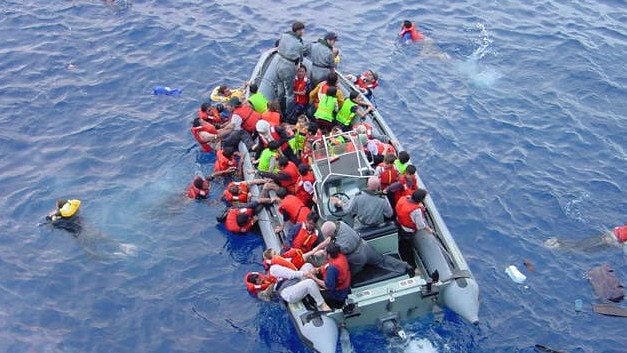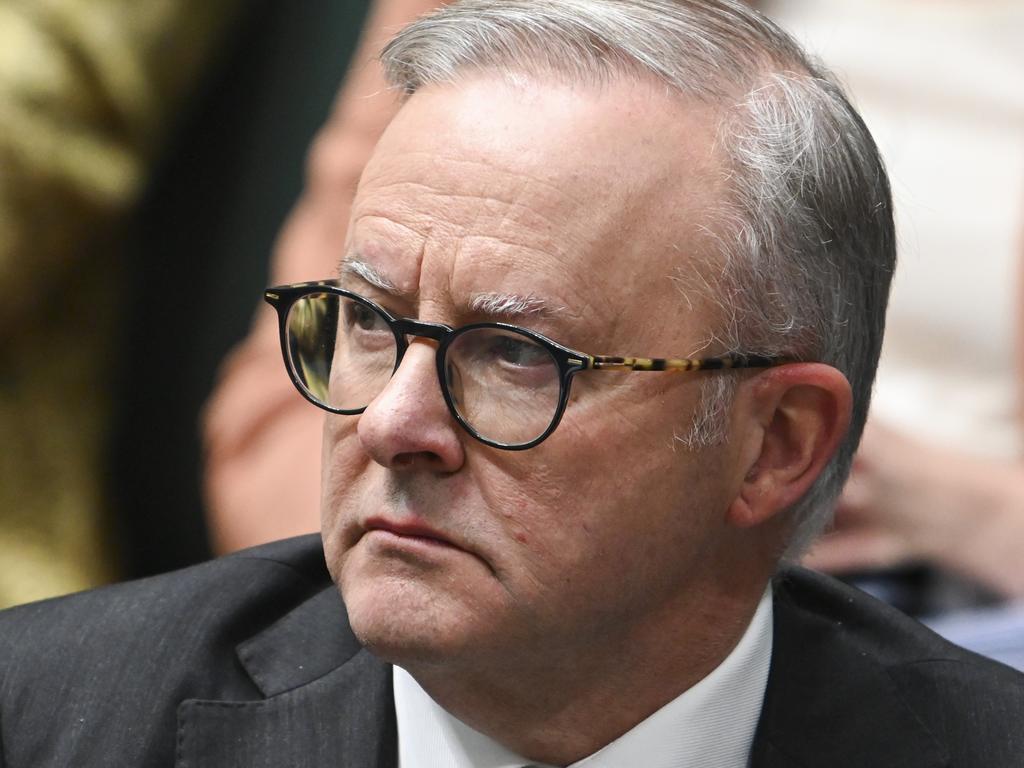Who is ASF 17? The bisexual Christian who wants to stay
Explained: the claims of ASF 17, the man at the centre of a High Court hearing today over Australia’s border regime. It’s a fresh drama the Albanese government doesn't need.

A battle over Australia’s borders is raging in the High Court – and at its centre is a man by the pseudonym of ASF 17.
He is 37 years old, and was born in a small Iranian city called Ilam, in the foothills of the Kabir Kuh mountain range.
In 2013 he came to Australia by boat, just as a wave of maritime arrivals was causing political mayhem.
He applied for refugee status – but it’s never been granted, and he’s spent more than a decade in immigration detention.
What is ASF 17’s claim?
This man says he can’t return to Iran because he is bisexual – and therefore, could be arrested and even executed under the country’s strict laws against homosexuality.
He’s converted to Christianity and has voiced opposition to the Iranian government’s treatment of women.
But Australia is insisting this man must go home to Iran – and now he’s at the centre of a new round of political mayhem about the issue that the Labor Party fears more than anything else – refugees.
The Australian’s national editor Dennis Shanahan sums it up like this: “So what we’re actually seeing, is we’re losing sight of the human aspect here as people try and outdo each other on tough border protection.
“And of course, we have seen this for the last 20, 25 years, where the humanitarian aspect is wound up in the tough talk of politics.
It all turns on a High Court case where ASF 17 is seeking to be released from immigration detention – based on an earlier High Court ruling that Australia could not legally detain people who had nowhere else to go.
The Albanese government is scrambling to ensure the High Court doesn’t release ASF 17 and scores more detainees.
But its attempt to pass legislation got logjammed in federal parliament, with all sides accusing the others of being at fault.
Why was ASF 17’s refugee application denied?
According to documents filed in court, ASF 17 says he is Kurdish – that’s an ethnic minority in Iran which has suffered generations of persecution.
He says he’s stateless and undocumented – so has no paperwork to prove his identity.
His story has changed over the years – he initially told interviewers he was an Iranian citizen, and that he’d done military training.
He also claimed he’d converted to Christianity – another factor he said would make him likely to be persecuted in Iran. He also said in his interview he had left Iran for economic reasons.
Government officials say they found an Iranian driver’s licence among his possessions – which they said indicated he was Iranian, and not a stateless Kurd as he now claims – and that other evidence indicated his family owned property, which was not possible for people who aren’t Iranian citizens.
The Government also says they don’t believe his conversion to Christianity is genuine – that this is something he’s made up to bolster his claim to stay.
All those reasons led the Government to reject his status as a refugee – and that’s where it’s remained stuck for years.
He’s refusing to voluntarily go back, and the Government doesn’t have the power to forcibly send him home.
ASF 17 has said he’ll go anywhere but Iran. The Commonwealth says there are no other options. And Iran has historically refused to accept its citizens in situations like this.
Hence the Government’s urgency to fix this problem.
Why is this a problem for the Government?
It’s been under attack on this issue since February, when the High Court decided to free another man from prison.
He’s known only as NZYQ – and he’s from Myanmar’s persecuted Rohingya community.
After arriving in Australia and being granted a temporary visa, he sexually assault another refugee – a 10-year-old boy.
He’s served a prison term for that offence – but on his release, when the Government tried to send him back to Myanmar, he refused to go.
The Government held him in detention and the High Court ruled that was illegal.
That decision also freed another 150 detainees including some serious offenders – murderers and rapists.
It’s been the cause of some of the most chaotic scenes of this government’s term.
The minister, Andrew Giles, says: “This is the reality of the High Court’s decision. The government did not choose to be in this position.”
Opposition leader Peter Dutton says: “The sad reality of their inaction, of the inadequacies, if their hopelessness, is that some of these offenders are likely to reoffend.”
Dennis Shanahan: “It’s a question of the blame game. The coalition will say the government’s responsible, it’s their fault. And of course, Labor will say it’s the coalition because we wanted to get this legislation through – it’s legislation they should support and they didn’t. So come May or June, after a High Court decision or two, we may see the blame game come out in full bloom in the next sitting of parliament.”
What happened to the detainees already freed?
One of the detainees freed by the High Court’s February decision was Aliyawar Yawari.
He’s from Afghanistan – who came to Australia by boat after his father and brother were killed by the Taliban – was living in Adelaide on a temporary visa when he was convicted of multiple attacks and indecent assaults on elderly women.
One woman he punched repeatedly in the face before having sex with her. He served a prison term and, just like the Rohingya man, says he can’t return home for fear of persecution.
After being released by the High Court he was staying at an Adelaide motel when a female guest accused him of sexual assault.
He’s been charged and is now back in custody awaiting trial. He hasn’t yet entered a plea and has not been convicted over this matter.
You can see why this is so hot for the Government.
Is Labor weak on borders?
In March, the government tried to rush through new legislation that would give it extraordinary powers to deport criminally convicted detainees who refuse to go home when they’re told.
But the Senate wouldn’t pass the legislation.
Remember – the Government is 13 votes short of a majority in the Senate, so needs all 11 greens plus two crossbenchers to pass its laws.
The Greens said sending asylum seekers into the hands of the persecutors was inhumane.
The Coalition won’t help out either.
Frontbencher Michaelia Cash: “Well guess what? We are not going to do that. We are going to stand firm on behalf of the Australian people. We will support this motion and we will ensure that this bill gets the proper scrutiny it requires. Because, as I said, you’ve said it’s not urgent.”
Here’s Dennis Shanahan again:
“Now, the government thought the coalition would just pass this legislation because it basically looks like coalition legislation.
“Now there is a risk here for the Coalition: if there are consequences as a result of this legislation not being passed before at least May and possibly June, as a result of High Court decisions yet to be made, that could be a backlash for the coalition.
“But in the meantime, it looks like the government has not been able to prove its case, to overturn normal processes and procedures. And what it is actually now doing is making it look even messier than it was before.”
What is Labor’s record on borders?
Immigration policy is a touchy subject for Labor. There’s a perception the party has been soft on borders and these kinds of bungles have lost it more than one federal election.
This time, Anthony Albanese’s government is trying to solve a problem it didn’t create – the indefinite detention policy that got us here was introduced by the Howard government.
And now they’ve found themselves between a rock and a very hard place.
If they relax on border security, people smugglers thrive, potentially putting the lives of desperate asylum seekers at risk.
If they hold firm, people who arrive by boat invariably wind up in detention for years or even decades – an outcome that’s criticised as inhumane.
Dennis Shanahan: “This is a big issue. And now the government is trying after years of trying to paint Peter Dutton as being the tough person on immigration and a nasty person, they’re actually now adopting policies which are as draconian and drastic as any of the coalition policies in the past.
“And they are now curiously caught in the position where they’re putting up this very tough legislation, which includes mandatory detention of 12 months in jail for somebody who refuses to go back to the country of origin, even if they fear prosecution.
“Mandatory detention has been one of those issues that Labor would never adopt. It is a real no-no.”
What do the Greens say?
Dennis Shanahan: “the Greens really lambasted Labor for this. And what we’re seeing is this adoption of this draconian legislation in an attempt to show that they are as tough as the Coalition on the issue of border protection.
“Andrew Giles, the immigration minister, was previously a lawyer acting for refugees. So you can see how conflicted personally some of the ministers are in this position.
“It is a very hard issue for Labor and trying to put up this tough legislation – because it has now failed to get through when they wanted it through – hasn’t helped Labor’s image in trying to be a tough government on border protection.”
Can the law be changed?
The legislation won’t have a chance to be reconsidered by parliament until May – after the High Court makes its decision on ASF 17, the man from Iran.
Dennis Shanahan: “We’ve also had the arrival of people from people smugglers boats in north Western, Australia.
“So the issue is red hot. But the wider problem for Labor is that the immigration detainee debacle keeps in front of mind the border protection issue, and the whole issue of immigration.
“There’s been a million net arrivals in Australia. And publicly, people are seeing the housing crisis linked to record immigration.
“Then there is the problem that all this talk about immigration is preventing the government from talking about the economy in this pre-Budget period.
“And of course, after the budget, the government doesn’t want to be talking about immigration detainees, asylum seekers and illegal boat arrivals.
“They want to be talking about the economy.
“So there’s a triple whammy here for the government, arising from the initial problems on the release of the immigration detainees into the community almost six months ago.”
This is an edited transcript of our daily news podcast The Front. Find it on Apple Podcasts, Spotify or The Australian’s app.






To join the conversation, please log in. Don't have an account? Register
Join the conversation, you are commenting as Logout